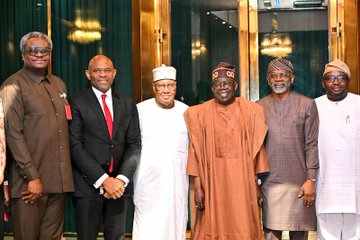President Bola Tinubu on Friday appealed to power generation companies (GENCOs) for more time to finalise the verification of significant long-standing debts owed to them by the Federal Government (FG).
During a meeting with the Association of Power Generation Companies at the Presidential Villa, Abuja, Tinubu affirmed his administration’s dedication to resolving the severe liquidity challenges plaguing Nigeria’s power sector.
Olu Verheijen, Special Adviser to the President on Energy, disclosed that Tinubu has granted anticipatory approval for a substantial ₦4 trillion bond program specifically designed to address the sector’s financial shortfall.
Acknowledging the considerable liabilities inherited from previous administrations, Tinubu assured the GENCOs of his commitment to a fair and transparent resolution.
READ ALSO: Kwankwaso accuses Tinubu of developing Southern region, marginalising North
“I accept the assets and liabilities of my predecessors, and there is no question about that,” he stated.
“But that acceptance must be on credible grounds. I need to wear the audit cap of verifiability, authenticity, and the fact that this inheritance is not a mere deodorant but a support structure for critical economic and industrial promotion.”
The President emphasised the necessity for patience from both the GENCOs and financial institutions, explaining that government agencies are actively engaging audit and legal firms to meticulously scrutinise the claims.
“Give us time to do verification and validation of the numbers,” he urged.
Reaffirming his belief in a market-driven electricity sector, Tinubu noted that the industry’s long-neglected legacy issues are now receiving priority attention.
He also highlighted savings from fuel subsidy removal and the introduction of Compressed Natural Gas (CNG) as an alternative.
Tinubu reassured the banking sector of the government’s resolve to create a stable investment climate, cautioning against extreme measures such as asset foreclosures against generation companies.
“To our friends in the banking sector, I ask that we avoid foreclosures. Sharpen your pencils, but keep an eraser handy. Let’s persevere together,” he advised.
He underscored electricity’s pivotal role, describing it as ‘the most important discovery of humanity in the last 1,000 years’ and fundamental to economic growth and human dignity.
Special Adviser Verheijen attributed the power sector’s liquidity crisis to a combination of ‘unfunded tariff shortfalls and market shortfalls’ that have accumulated over a decade.
She confirmed that as of April 2025, the FG’s verified exposure to GENCOs stands at ₦4 trillion, a sum accrued since 2015.
While GENCOs claimed about ₦4 trillion for the period from 2015 to the end of 2023, the Nigerian Bulk Electricity Trading Company (NBET) has so far validated ₦1.8 trillion of these claims.
An additional ₦200 billion in unfunded subsidies has further contributed to the federal government’s liability, bringing the total current exposure to ₦4 trillion, though this figure remains subject to final validation and negotiation before bond issuance.
READ ALSO: Atiku slams Tinubu for meddling in opposition affairs amid national crises
Minister of Power, Adebayo Adelabu, commended Tinubu for his focused attention on the power sector, crediting the administration’s reforms with restoring investor confidence and enhancing performance across the electricity value chain.
Adelabu highlighted critical milestones achieved in less than two years, including the signing of the Electricity Act, 2023 – the President’s first legislative act, which liberalises the market.
He noted the launch of Nigeria’s first Integrated National Electricity Policy in 24 years, attracting over $2 billion in new private capital, and a 70% growth in the sector’s annual revenue (from ₦1 trillion in 2023 to ₦1.7 trillion in 2024), reducing government subsidy obligations by over ₦700 billion.
Adelabu reported an increase in installed generation capacity from 13,000 MW to 14,000 MW, with a record peak generation of 5,801 MW and maximum daily energy delivery of 120,370 MWh achieved on March 4, 2025.
He announced that there had been no national grid collapse in 2025, attributing this to interventions under the Presidential Power Initiative, which added over 700MW of transmission capacity.
Significant progress in narrowing Nigeria’s metering gap was also reported, through the ₦700 billion Presidential Metering Initiative and the World Bank-supported Distribution Sector Recovery Programme (DISREP).
Despite these strides, Adelabu warned that the sector faces an urgent liquidity crisis that could jeopardise the sustainability of ongoing reforms.
He appealed to the President for immediate support to at least partially clear these obligations over a defined period and urged continued backing for structural reforms to ensure a resilient and financially viable power market.
Business leaders Tony Elumelu and Kola Adesina also made fervent appeals for swift intervention.
Elumelu described the situation as a ‘last hope’, emphasising that GENCOs are heavily indebted to banks, with real foreclosure threats looming due to systemic arrears.
He praised the Tinubu administration for restoring integrity to oil production, noting that daily output has recovered from a 97% loss in 2023 to 98% retention today.
“We don’t need power to complete your transformation, we need power to enable it,” Elumelu stated, urging a resolution to the debt issue.
Adesina reiterated the critical need for immediate liquidity, also raising concerns about gas supply shortfalls.
He warned that without urgent action, generation capacity would stall, imperilling Nigeria’s industrial and economic aspirations.
READ ALSO: Ex-Lagos deputy gov Bucknor-Akerele criticises Tinubu’s 2027 ambition
Adesina specifically proposed unlocking 800 million cubic feet of gas through NLNG to boost supply to underperforming power plants in the Afam axis.
The high-level meeting saw the attendance of key government officials, including the Chief of Staff to the President, Femi Gbajabiamila; the Coordinating Minister of the Economy and Minister of Finance, Mr. Wale Edun; and the Minister of Information and National Orientation, Alhaji Mohammed Idris, alongside various regulators and stakeholders from the electricity industry.



